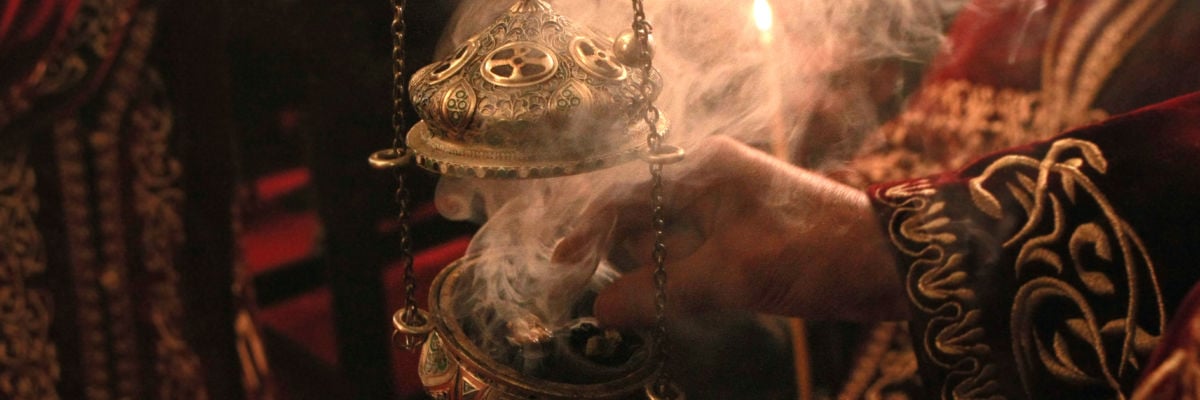
Many people, particularly within our pews, do not know the reasons for the use of incense in worship. Even I, when I was a Franciscan friar using incense as an altar server, often thought, “Why?”
All of us who see incense need to reflect on its purpose, for we don’t do meaningless activities at Mass. When I reflected on its place in Scripture, I found that there is a surprising number of verses on the matter.
The first instance of incense appears over a thousand years before Jesus. It was the major event on Mount Sinai in Exodus 24: God came down as a large cloud over the mountain, with fire, and Moses was called up into the cloud. God did not come down casually with a human face. Nobody could even see him! He was clouded in mystery. Exodus 24:15-18 reads,
Then Moses went up on the mountain, and the cloud covered the mountain. The glory of the Lord dwelt on Mount Sinai, and the cloud covered it six days. And on the seventh day he called to Moses out of the midst of the cloud. Now the appearance of the glory of the Lord was like a devouring fire on the top of the mountain in the sight of the people of Israel. Moses entered the cloud and went up on the mountain. And Moses was on the mountain forty days and forty nights.
This powerful event would have been imprinted onto the consciousness of every Israelite, for God showed up powerfully and mystically. It would have led ancient Israel to have radical respect for God. For people cannot control something that they cannot even perceive! Like a teacher with his students during the first week of class, the cloud literally put the fear of God in them. They recognized the gravity of just whom they were dealing with. That was the power of a cloud of smoke—it veiled Israel’s vision and thereby increased their awe and respect for God.
I’d argue that this event was recalled nearly every day in the Tabernacle and Temple rite of burning incense. For God commanded Aaron, Israel’s first high priest, to create a cloud of incense within their sacred space every morning and every night (Exod. 30:7-8). As biblical scholar L. Michael Morales says, incense is a smokey cloud, like on Sinai (99). It was as if Israel replicated God’s past mighty presence on Sinai into a memorial.
The same is true with the Catholic Church’s utilization of incense today. It brings us back thousands of years to the time of Moses and ancient Israel, who got to behold the miraculous and stupefying face of God. The Church’s reasoning seems to be that if the Jews did this all the time, and Jesus did not come to abolish, but to fulfill (Matt. 5:17), then shouldn’t we do the same?
I’d argue that we also need a visible reminder of God’s presence. The Jews knew that the human heart is forgetful. They literally kept a piece of Scripture above their foreheads (called phylacteries) to avoid forgetting it, and they likewise kept the Sinai event consistently before their eyes and noses. We should as well. Just as incense reminded them of God’s smokey presence and his past deeds within salvation history, and increased their sense of awe and respect for him, it can do the same for us.
There is so much more. Consider Numbers 16, where the Israelites murmured after Korah rebelled against Moses and Aaron’s priestly authority . . . and suddenly died. God swiftly intervened in vindication of his chosen priestly authorities, and he delt the temporal punishment of a deadly plague to those murmuring. In response, Moses told Aaron to grab some incense to cover the people as a means of “atonement” (Num. 16:46). When Aaron did this, he “stood between the dead and the living, and the plague was stopped” (v. 48). This suggests that those on the side of Aaron who had the incense around them did not die, whereas everybody else without the incense did. Incense literally protected the Jews from God’s just punishment for their sins!
Yet how did it protect them? To this, I would apply what the early Christians said about incense. They said that the sweet smell of incense cloaked the foul-smelling sins of the people. The ancient liturgy of St. James says, “Accept from us, thy unprofitable servants, this incense as an odor of a sweet smell, and make fragrant the evil odor of our soul and body, and purify us with the sanctifying power of thy all-holy Spirit.” Incense brought atonement in Numbers 16 because of the truth that anybody covered with incense smells blameless and sweet to the Holy One. This can help atone for sins.
Eschatology (the end things) is connected to incense as well. For if God dwells in the clouds of heaven, then incense brings us into heaven. When the prophet Isaiah saw a heavenly vision of God, he saw the surroundings “filled with smoke” (Isa. 6:4). The Psalms refer to God being surrounded by clouds (97:2). Jesus ascended into heaven on a cloud (Acts 1:9). If heaven, our eternal destination, is cloudy or smokey or “incensey,” and the Mass is heaven on earth, then incense and Mass would go hand in hand.
In fact, whenever Scripture talks about the place of heaven, it seems always to be fuming with smoke or incense. The heavenly liturgy found in Revelation is full of it. The “four living creatures and the twenty-four elders fell down before the Lamb, each holding a harp, and golden bowls full of incense, which are the prayers of the saints” (Rev. 5:8). If we add up all those bowls of incense, it totals to at least twenty-eight thurifers at the Mass in heaven (and we often complain at just one!). This was probably why the early Christians burned incense in their liturgies. It was found in Revelation and was a handy symbol for prayer rising up to and being received and attended to by God. Incense reminds us of the heavenly things.
There is more to talk about, such as the three Magi offering baby Jesus frank-incense (Matt. 3) and the prophet Malachi predicting that every place will have incense offered to God (1:11), but I think that’s enough for one article. Incense veils our vision of God, increases our respect for him, reminds us of him, memorializes his past deeds, atones for sins, and reminds us of our true home in heaven.



